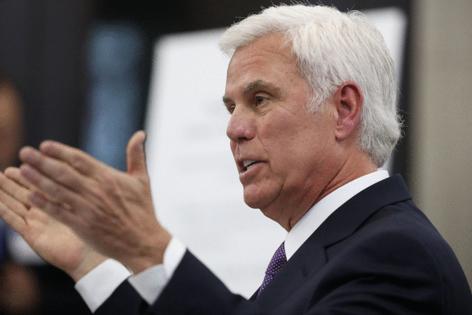Racketeering charges against political power broker George Norcross should be reinstated, NJ prosecutors tell appeals court
Published in News & Features
New Jersey prosecutors urged an appeals court to reinstate criminal racketeering charges against Democratic power broker George E. Norcross III, arguing that a judge erred in dismissing the indictment without reviewing evidence that was presented to the grand jury.
In his February decision, prosecutors said, Mercer County Superior Court Judge Peter Warshaw effectively threw out five months of work by the grand jury — which heard 2,000 pages of testimony and hundreds of exhibits — and reached determinations about Norcross’ motivations through a faulty analysis.
“In short, not a single precedent supports the trial court’s facial approach, and reams of published cases contradict it,” Deputy Attorney General Adam D. Klein wrote in his office’s filing late Monday with the Superior Court’s Appellate Division.
It’s unclear how long the appeals process might play out. The case could ultimately reach the New Jersey Supreme Court.
The 13-count indictment accused Norcross and five co-defendants of using threats of financial and reputational harm — and his control of local government — to obtain Camden waterfront property and millions of dollars in state tax credits.
Norcross, 69, is executive chairman of insurance firm Conner Strong & Buckelew, chairman of Cooper University Health Care, and a longtime Democratic leader in South Jersey. He and his co-defendants — his brother Philip, CEO of the law firm Parker McCay; attorney William Tambussi; former Camden Mayor Dana L. Redd; and two businessmen, John J. O’Donnell and Sidney R. Brown — were charged in June with racketeering conspiracy, extortion, and other crimes.
Norcross’ lawyers have described the prosecution, led by the office of New Jersey Attorney General Matthew J. Platkin, as a “sham.”
The defense in the fall asked the judge to dismiss the indictment, arguing that even if all the allegations in the indictment were proven true, they do not constitute criminal extortion or coercion.
Warshaw agreed, ruling that the indictment showed that Norcross and his associates engaged in lawful economic bargaining in the course of their efforts to redevelop the Camden waterfront.
But in reaching that conclusion, prosecutors contend, the judge failed to accept the factual allegations as true and view the evidence “in the light most favorable to the state,” as is required in such a pretrial motion.
For example, the indictment alleges that in the summer of 2016, Norcross told Philadelphia developer Carl Dranoff he would “f— you up like you’ve never been f— up before” if the developer did not agree to Norcross’ preferred terms in a real estate deal. Norcross also said he would make sure Dranoff never did business in Camden again, the indictment says.
In weighing whether this alleged threat and others were unlawful, the judge “interpreted both the facts and the law, concluding that [Dranoff] and George Norcross were ‘two heavyweights’ and that [Dranoff] ‘gives as good as he gets,’ — hardly a favorable inference to the grand jury’s allegations that these men were not on equal footing,” prosecutors said.
The judge ignored the grand jury’s finding that “George Norcross in reality controlled the Camden government that ultimately had power over permitting and eminent domain decisions that would directly affect both developers’ property interests,” Klein wrote.
“If a court has questions about what a threat means, or how a victim interprets it, the proper forum is trial testimony, or, at the least, a review of the actual evidence presented to the grand jury,” he added.
The Attorney General’s Office also pushed back against Warshaw’s finding that the threats described in the indictment as extortion actually amounted to lawful “hard bargaining.”
Under the law, “‘hard bargaining’ presumes that at least one party is using lawful economic leverage — pushing for favorable terms using market power, competition, or business strategy,” prosecutors wrote.
“The facts alleged here, by contrast, extend far beyond that narrow remit,” they said. “After all, the indictment alleges that defendants did more than simply threaten to exert a type of economic pressure to which all businesspeople are subject; it alleges that they threatened to impose reputational harm … and to use their control over government to deprive their victims of ‘a level playing field’ and cause them to ‘forfeit any potential business opportunity’ in the entire city of Camden in the first place.”
Prosecutors said the judge had also erred in ruling that the charges were barred under the statute of limitations. A key objective of the Norcross-led racketeering conspiracy was obtaining New Jersey tax credits to offset the cost of building an office tower and apartment complex, according to the indictment.
Companies controlled by Norcross and his co-defendants received and sold tax credits in 2022 and 2023, continuing a conspiracy that began in 2012 and making the charges timely, prosecutors said.
©2025 The Philadelphia Inquirer, LLC. Visit at inquirer.com. Distributed by Tribune Content Agency, LLC.







Comments